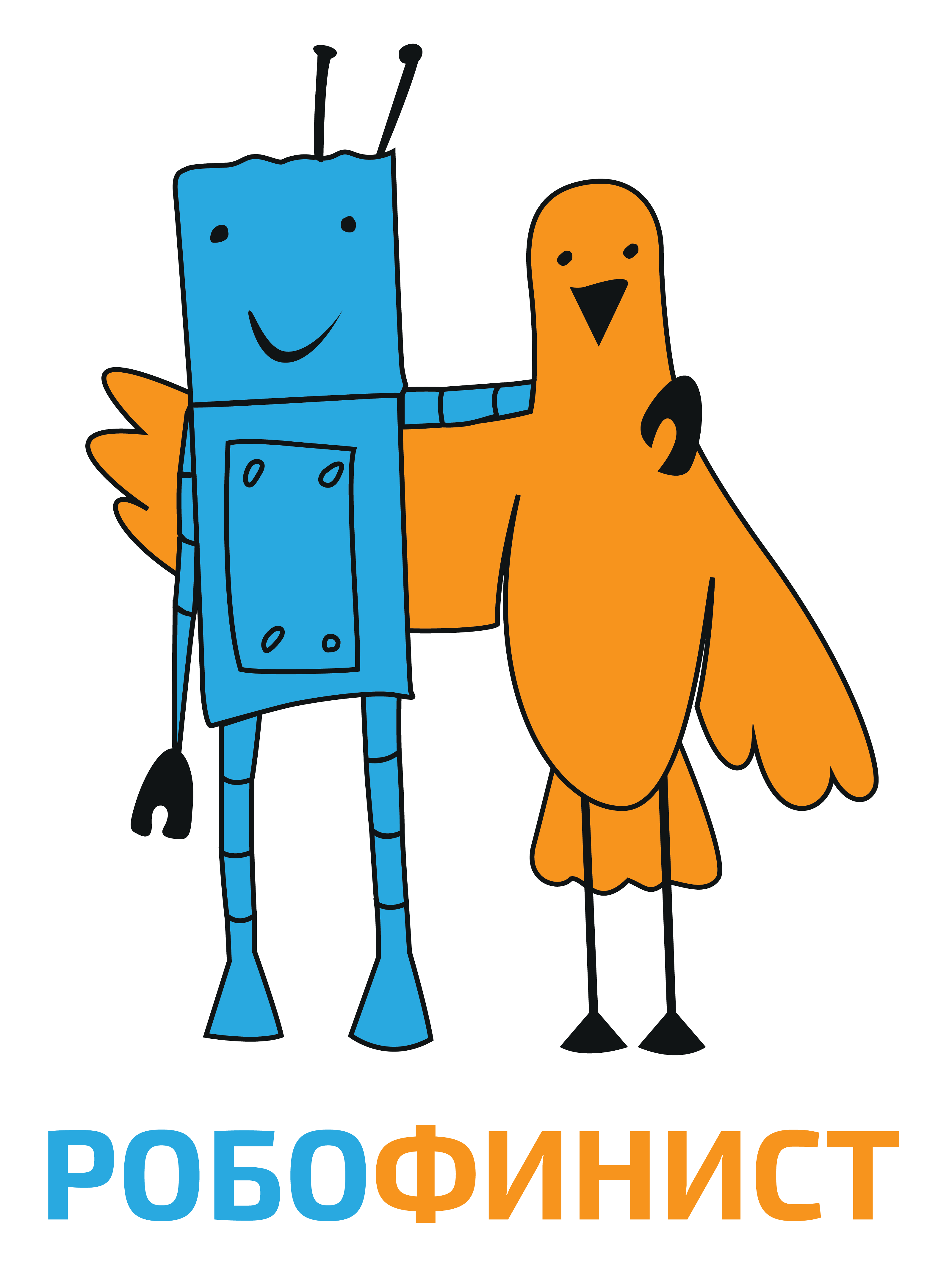- Narrow Line Follower: Educational Sets
- Narrow Line Follower
- The Journey: Junior
- The Journey: High
- Lego Sumo (15 x 15 cm, 1 kg)
- Mini Sumo (10 x 10 cm, 500 g)
- Micro Sumo (5 x 5 cm, 100 g)
- Humanoid Sumo
- Line - Pro
- Stepping robots marathon
- Humanoid Sprint
- Segway Race
- Relay Race
- Corridor Rally
- Arkanoid
- Air Race
- Intellectual Navigation Robotics Systems
- RoboCup Rescue Line
- RobocupJunior Rescue Maze
- RobocupJunior onStage
- RoboCup Junior Soccer Lightweight
- RoboCupJunior Soccer Open
- Remote Controlled Football 4×4
- Practical Robotics Olympiad: LEGO
- Practical Robotics Olympiad: TRIK
- Practical Robotics Olympiad: ARDUINO
- RTC Cup: Extremal Pro
- RTC Cup: Extremal
- RTC Cup: Seeker
- Freestyle category: Elementary
- Freestyle category: Junior High
- Freestyle category: High
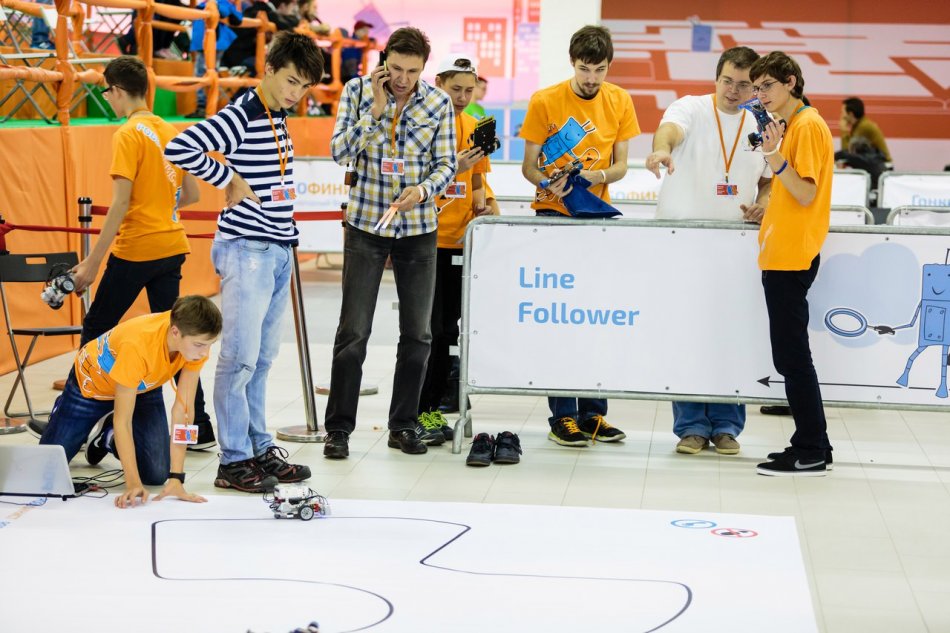
1 . Narrow Line Follower: Educational Sets

Robot’s task in this kind of the competition is to overcome the track along the black line for the least possible time. The robot shall drive along the black line in auto mode. This category is meant only for the robots created of the educational construction kits (Lego, Fischertechnik, VEX, Huna, TRIK, Robotis).

2 . Narrow Line Follower

Robot’s task in this kind of the competition is to overcome the track along the black line for the least possible time. The robot shall drive along the black line in auto mode. There is no restrictions to materials robot may be made of.
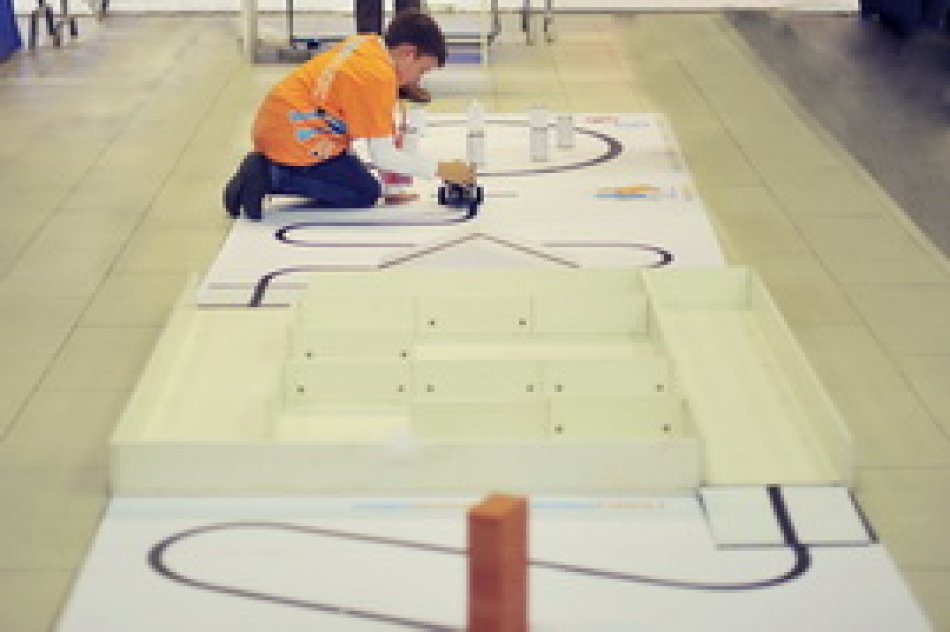
3 . The Journey: Junior

"The Journey" is a complex type of contest combining several common tasks. Robot should do these tasks one by one without stops and pauses. Up to and including two members in team.
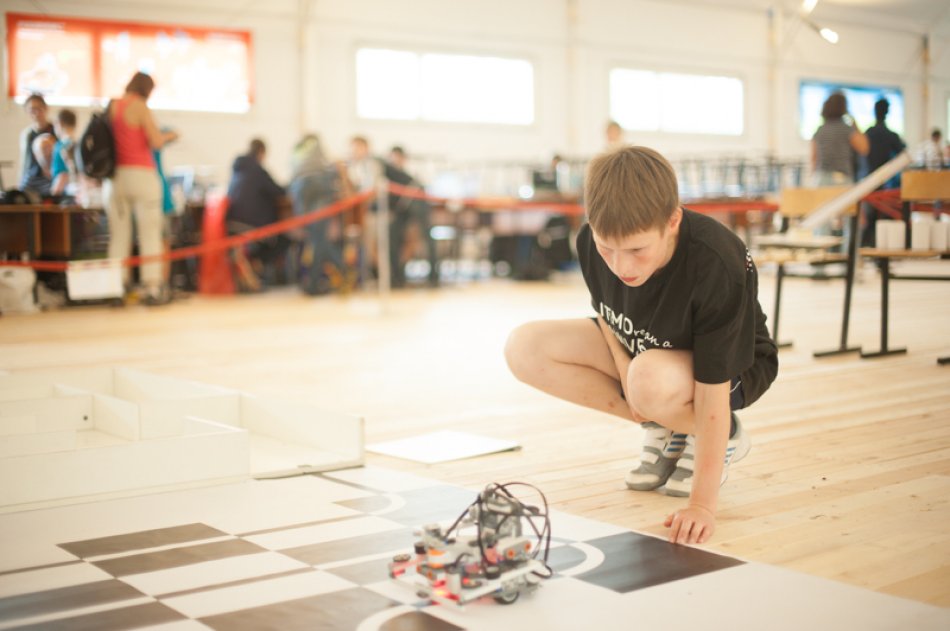
4 . The Journey: High

"The Journey" is a complex type of contest combining several common tasks. Robot should do these tasks one by one without stops and pauses. In the High category of the contest robot will have to go through the line with moving obstacle on it (robot should go round this obstacle and should not touch it), labyrinth, line with invertion after what kick out all but one the skittles from the ring in the Kegelring task. This skittle which robot should keep into the ring must be returned to the start - robot have to do all the tasks again! All these tasks must be done in five minutes.

5 . Lego Sumo (15 x 15 cm, 1 kg)

The contest is taking place on the ring where two robots are competing with each other. The ring is a black circle bordered with a white line. The objective of the robots participating in contest is to push its competitor out of the ring. This category is meant only for robots which construction is based on the educational construction kits (Lego, Fischertechnik, VEX, Huna, Robotis).
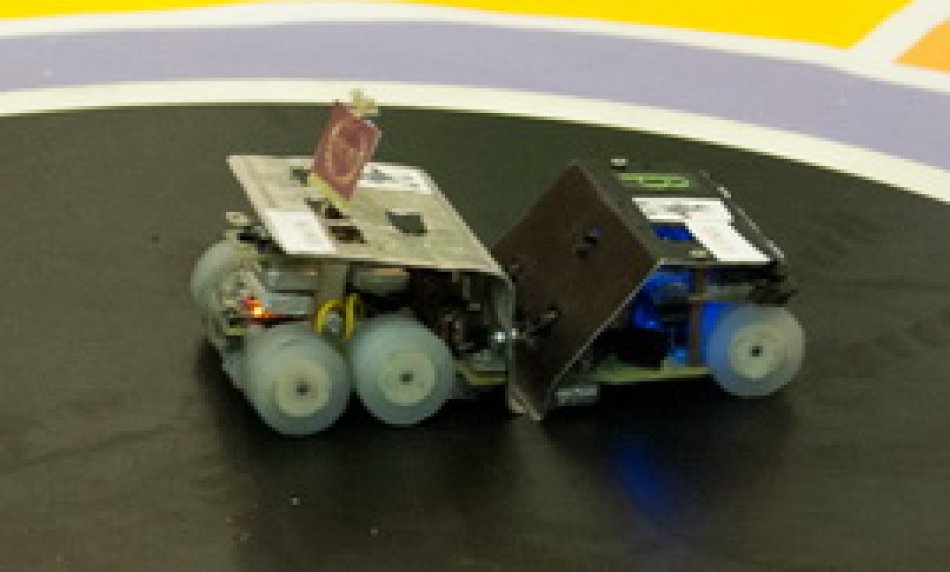
6 . Mini Sumo (10 x 10 cm, 500 g)

The competition is conducted for two robots on the ring that is black circle with white border line draw on ring perimeter. The aim of the competition is to push the robot-competitor outside the ring.

7 . Micro Sumo (5 x 5 cm, 100 g)

The competition is conducted for two robots on the ring that is black circle with white border line draw on ring perimeter. The aim of the competition is to push the robot-competitor outside the ring.
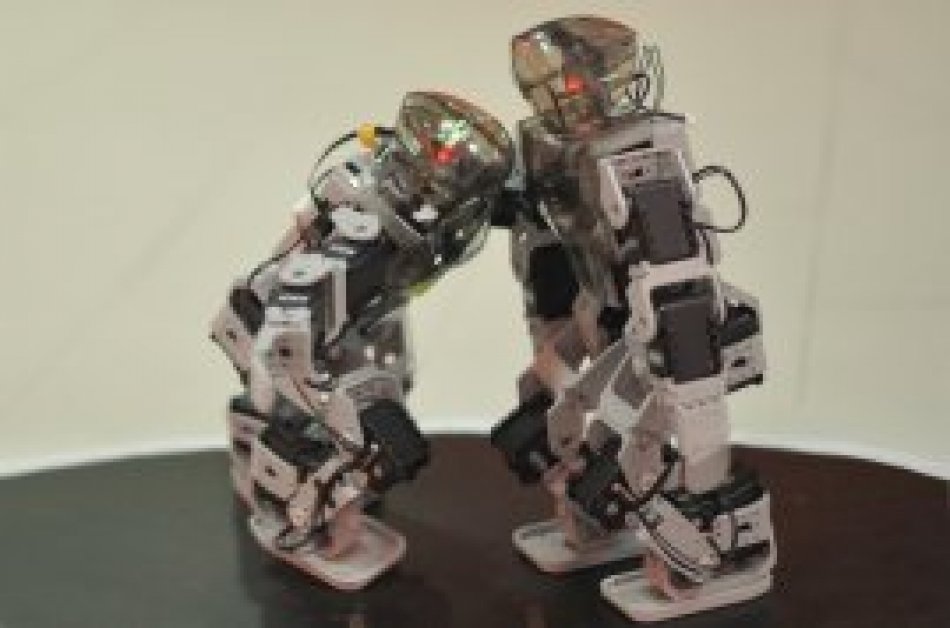
8 . Humanoid Sumo

The contest is proceeding between two robots on the ring which is black circle bordered with white line. The objective of the contest is to push the opponent robot out of the ring border. This cahtegory is only for humanoid robots.
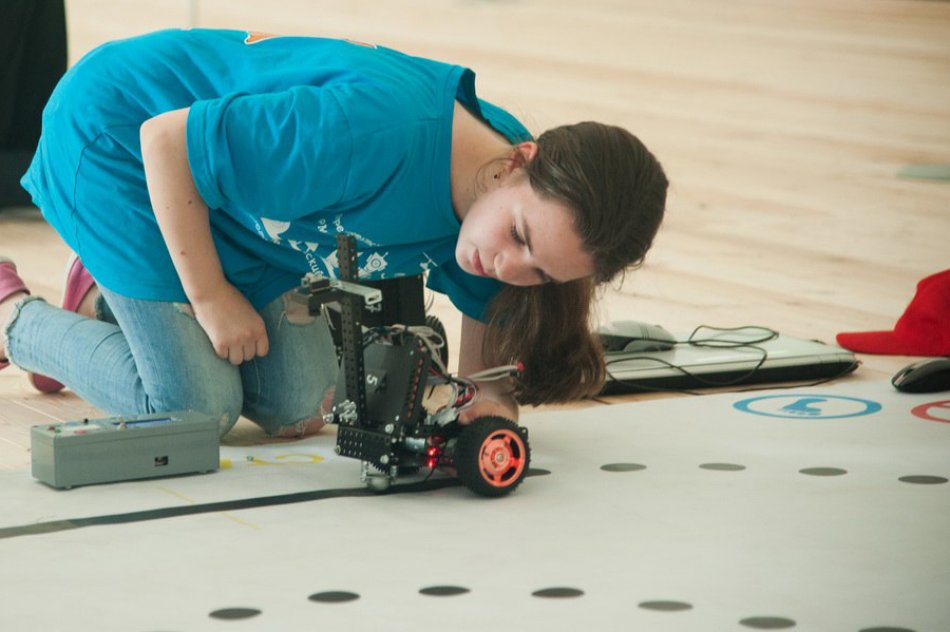
9 . Line - Pro

The contest is extention of the “Line Follower”, the only difference consisting in the continuous black line is replaced with a line of uniform objects. The robot’s objective is the same: get from the start to the finish as soon as possible.
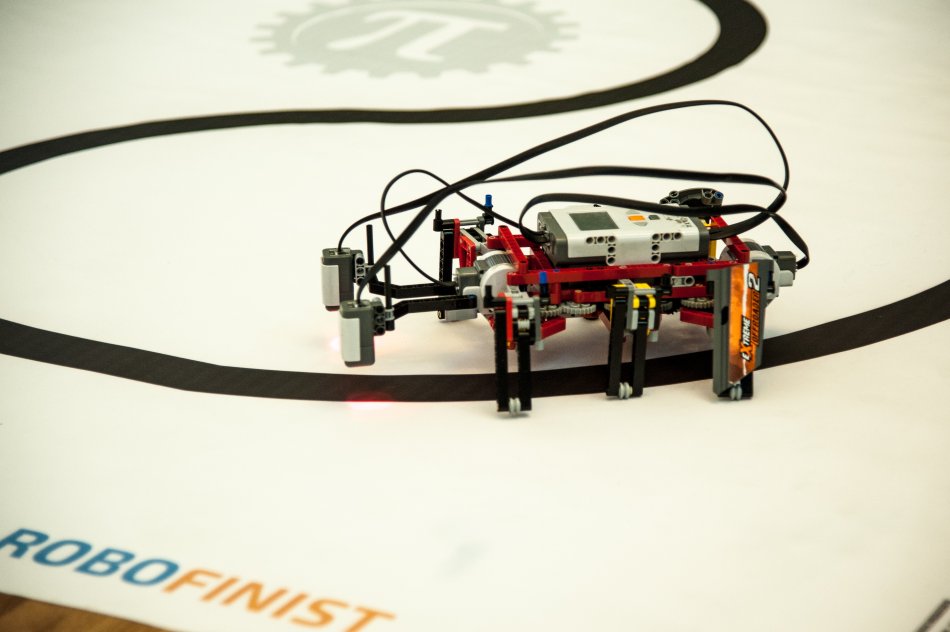
10 . Stepping robots marathon

The objective of this contest is to develop the robot with the special feet mechanism for the moving along the denoted trajectory at a step, run or jumps.
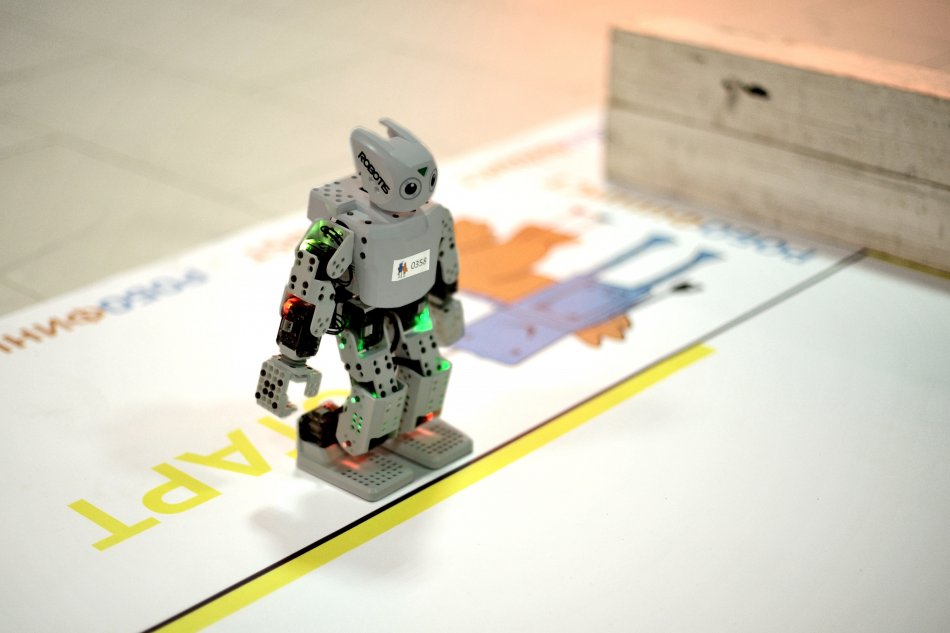
11 . Humanoid Sprint

The field is a corridor through which the humanoid robot shall pass for the least possible time. The robot in this type of competition is a two-legged walking humanoid capable of moving its center of mass in order to maintain balance while walking.
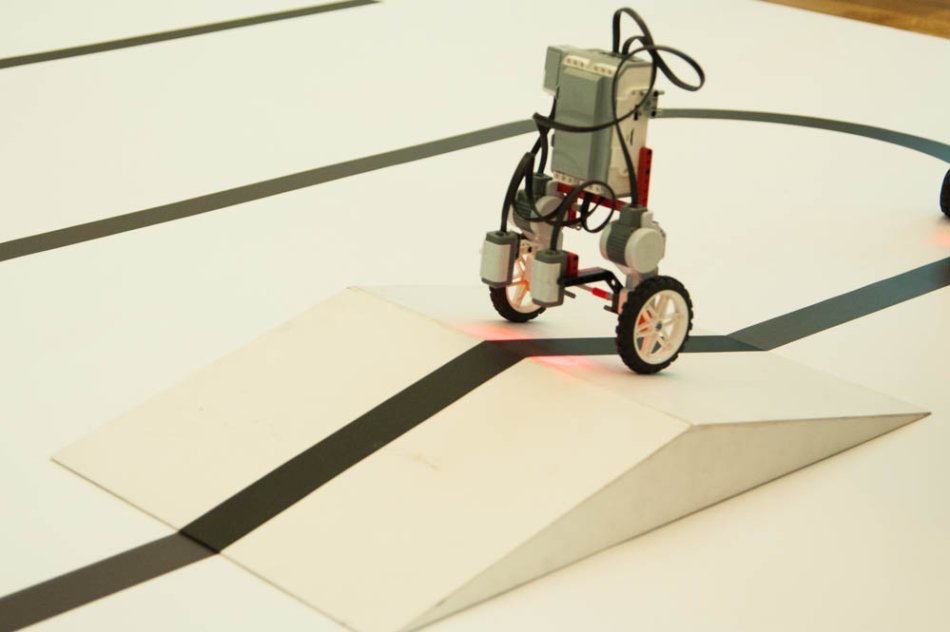
12 . Segway Race

Segway is the robot using to move just two wheels. Robots-segways must overcome the obstacle course in the fastest time.
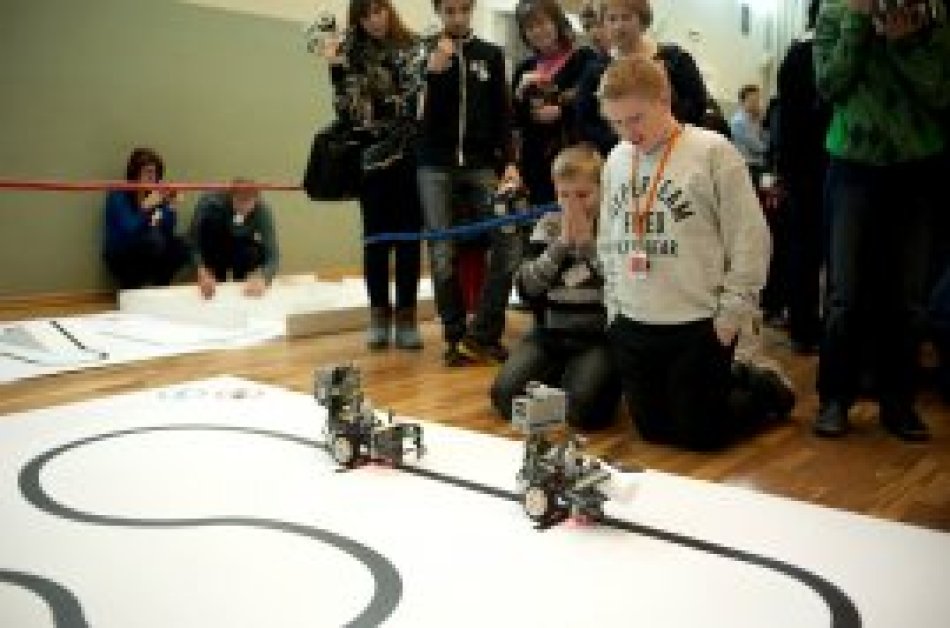
13 . Relay Race

During five minutes two robots of the same team shall drive the maximum number of laps along the line with a relay baton passing it every time in the exchange zone. The field is a white polygon with black line, crossroads and obstacles.

14 . Corridor Rally

The track for robot movement is a wavy corridor. In rally four-wheel cars take part with rear- or front-wheel drive and with steering front wheel. The competition itself consists of two stages. At the first stage the robot shall pass through the track from start to finish touching the wall the least possible number of times. At the second stage robots already participate by pairs. Robot wins if it reaches the finish first
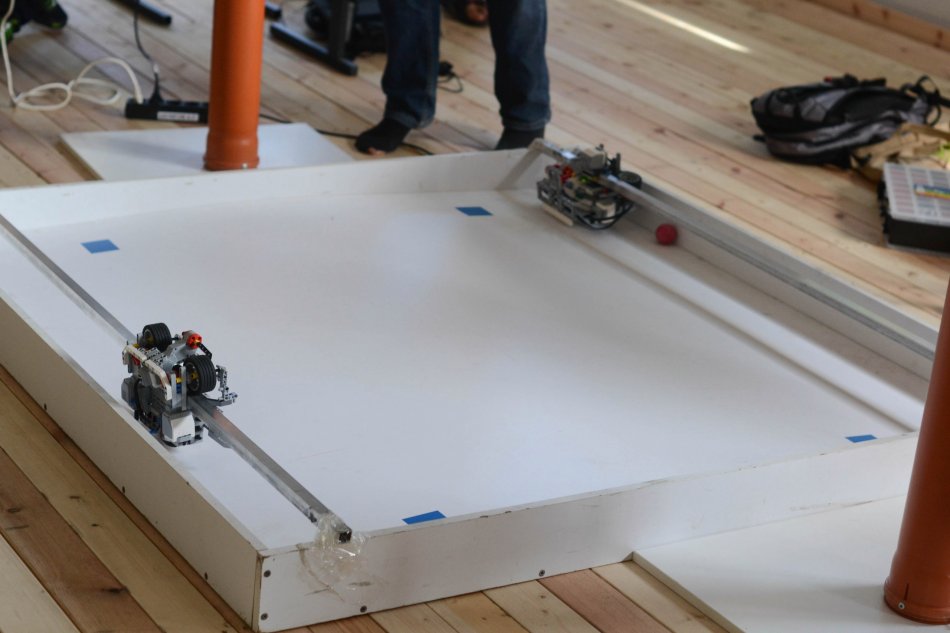
15 . Arkanoid

In the competition it is necessary to design and build a robot, which can play the game arkanoyd with the opponent. The robot moves along the rack on the side of the field controlled by a computer with help of a camera mounted above the field. The task of the robot is to roll the ball to the opponent's side.

16 . Air Race

Robots move over the air without touching the ground and air obstacles. There are two columns on the polygon around which the robot shall fly maximum possible times. The task is complicated because the path along which the robot shall fly around the obstacles shall have figure eight shape.
It is necessary to attach a video demonstration of the robot's operability and compliance to the requirements specified in the regulations.
It is necessary to attach a demonstration video of the robot's operability and compliance to the requirements specified in the regulations.
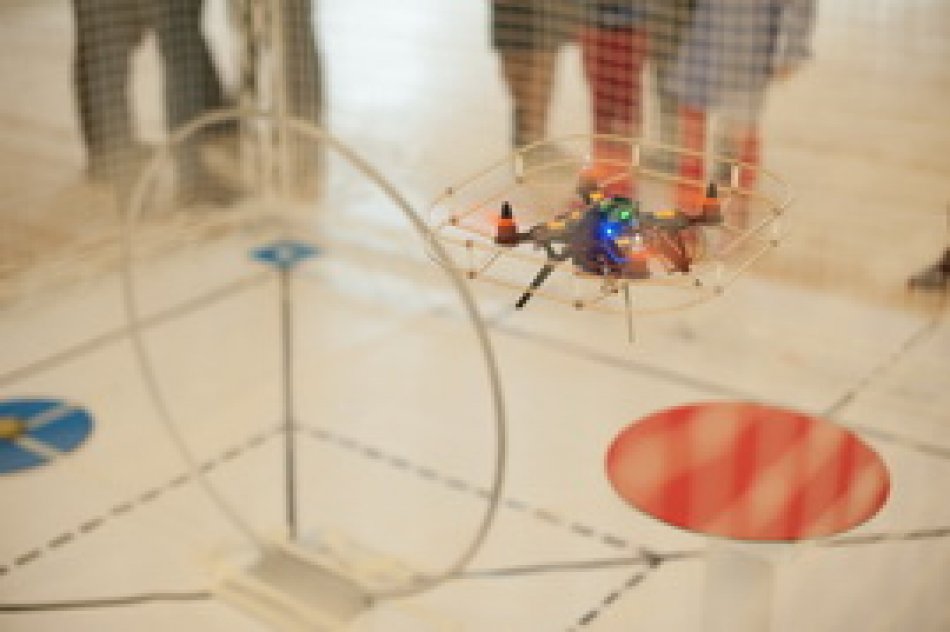
17 . Intellectual Navigation Robotics Systems

A team should make a intellectual autonomous robot, who can fly a confined space. It is necessary to attach a demonstration video of the robot's operability and compliance to the requirements specified in the regulations.
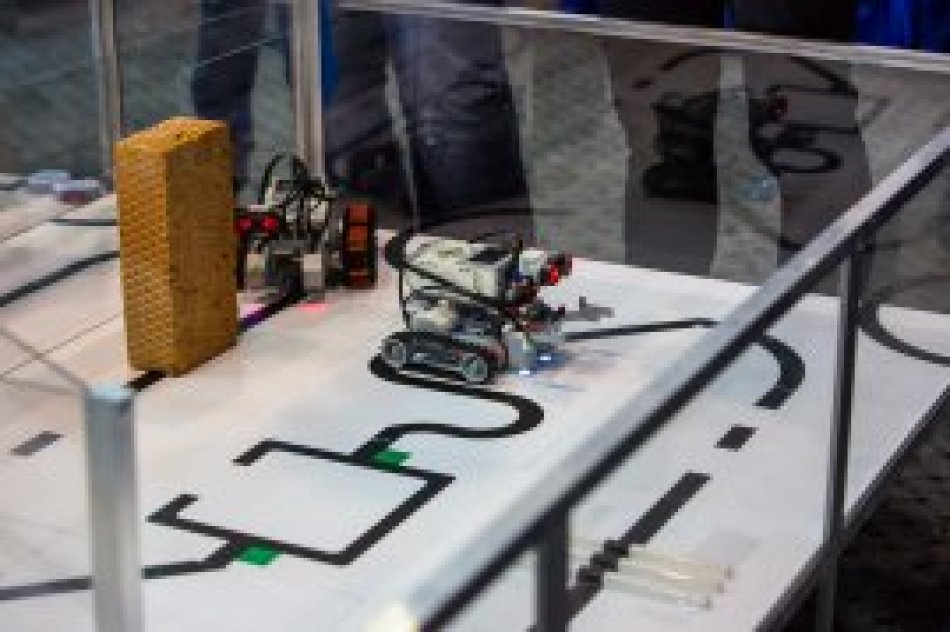
18 . RoboCup Rescue Line

The robot must be able to carry out the rescue mission in a fully autonomous mode with no human assistance. The robot must be durable and intelligent enough to navigate through treacherous terrain with hills, uneven land and rubble without getting stuck. When the robot finally finds the victims, it has to gently and carefully transport the victims to the safe evacuation point where humans can take over the rescue. After the victim rescue, the robot should be able to find its way out of the dangerous area.
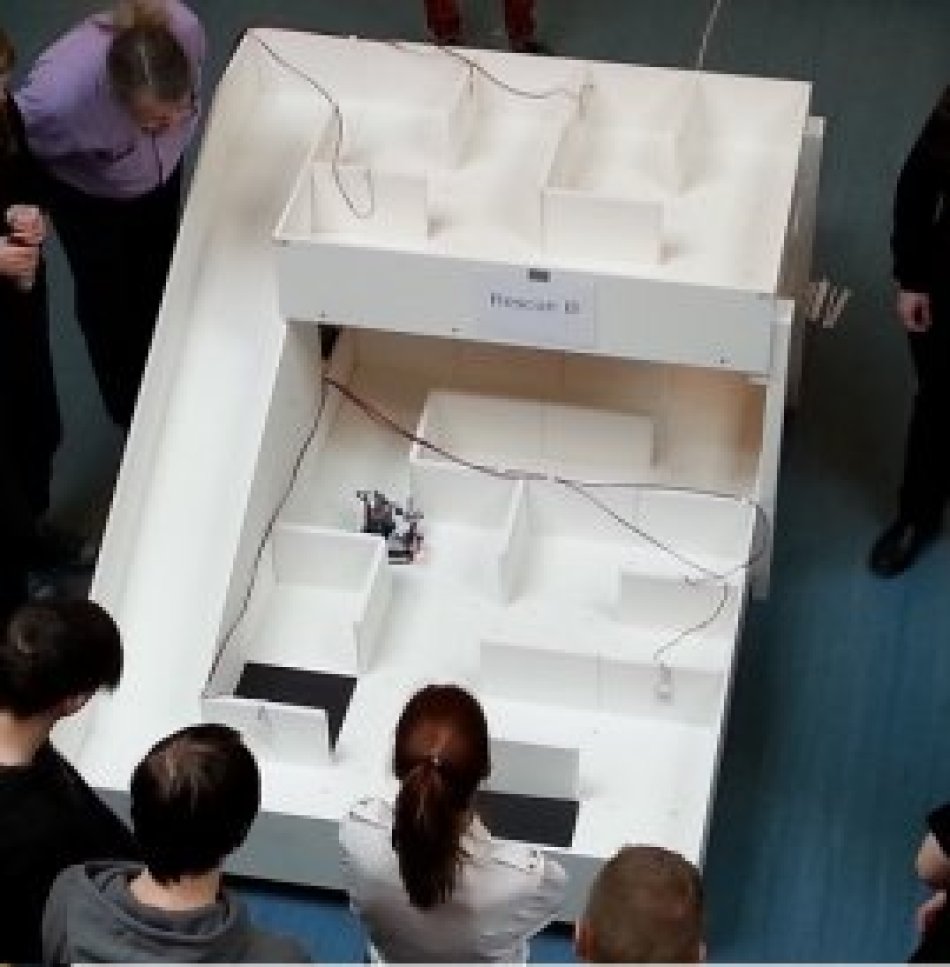
19 . RobocupJunior Rescue Maze

The robot must be able to carry out the rescue mission in a fully autonomous mode with no human assistance. The robot must be durable and intelligent enough to navigate through treacherous terrain with hills, uneven land and rubble without getting stuck. The robot must search for victims, dispense rescue kits.
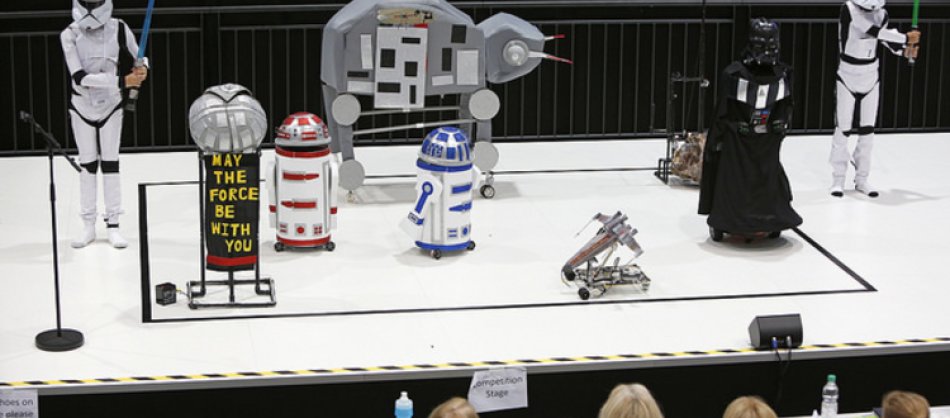
20 . RobocupJunior onStage

RobocupJunior onStage allows teams to present a 1-2 minute performance using standalone robots, designed, built and programmed by the team. These competitions are open. They include all kinds of performance, it can be dancing, history, theatrical performance or art installation. The performance can be accompanied by music. The team can use any number of robots on the scene.
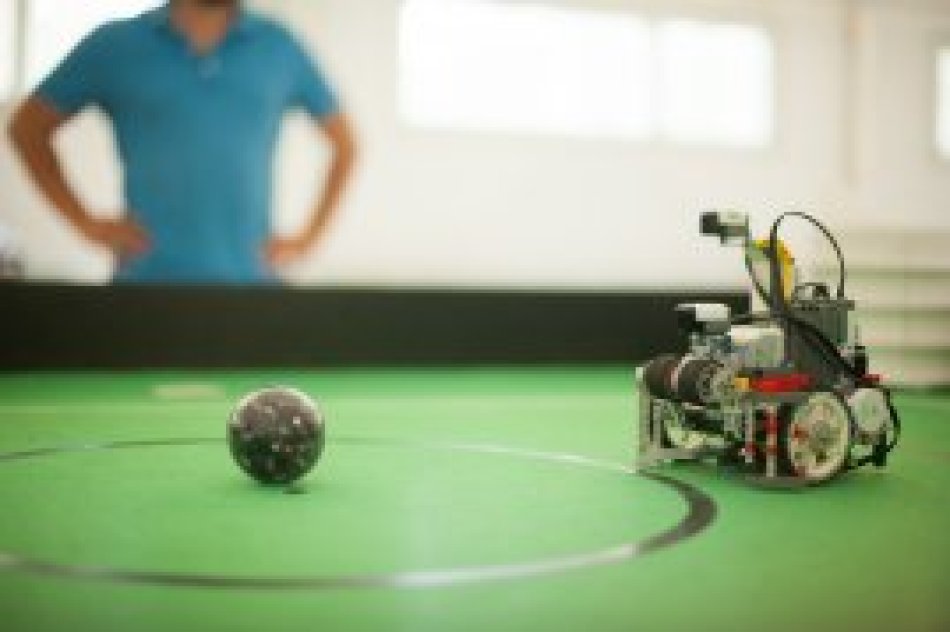
21 . RoboCup Junior Soccer Lightweight

2-on-2 teams of autonomous mobile robots play in a highly dynamic environment, tracking a special light-emitting ball in an enclosed, landmarked field. The robots used must be autonomous, designed and programmed by the team. Competitors must demonstrate their skills in programming, robotics, electronics and mechanics, as well as the ability to work in a team.
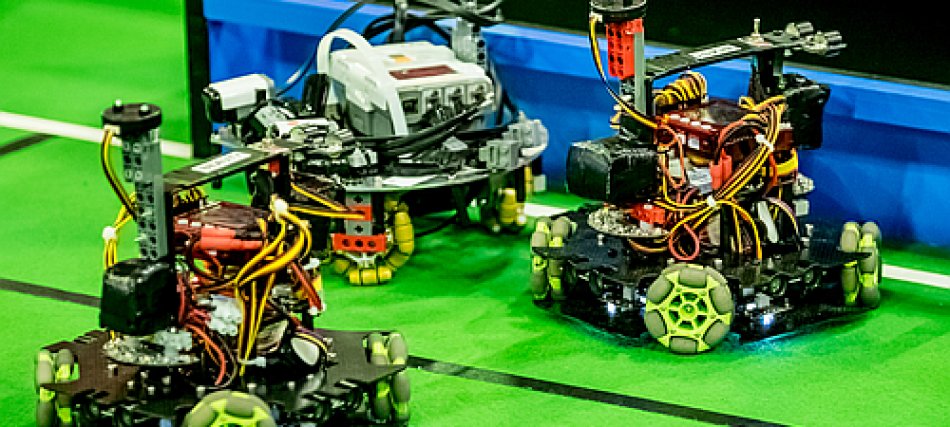
22 . RoboCupJunior Soccer Open

2-on-2 teams of autonomous mobile robots play in a highly dynamic environment. The robots used must be autonomous, designed and programmed by the team. Competitors must demonstrate their skills in programming, robotics, electronics and mechanics, as well as the ability to work in a team.

23 . Remote Controlled Football 4×4

Polygon is the decreased copy of the actual football field. Simultaneously 8 robots compete on it and these robots are controlled by the same number of participants. The team task is to make a goal maximum possible times in the competitor’s goals.

24 . Practical Robotics Olympiad: LEGO

At the beginning of this category all participants will receive unusual robotics tasks that shall be resolved within the specified time.

25 . Practical Robotics Olympiad: TRIK

At the beginning of this category all participants will receive unusual robotics tasks that shall be resolved within the specified time.

26 . Practical Robotics Olympiad: ARDUINO

At the beginning of this category all participants will receive unusual robotics tasks that shall be resolved within the specified time.
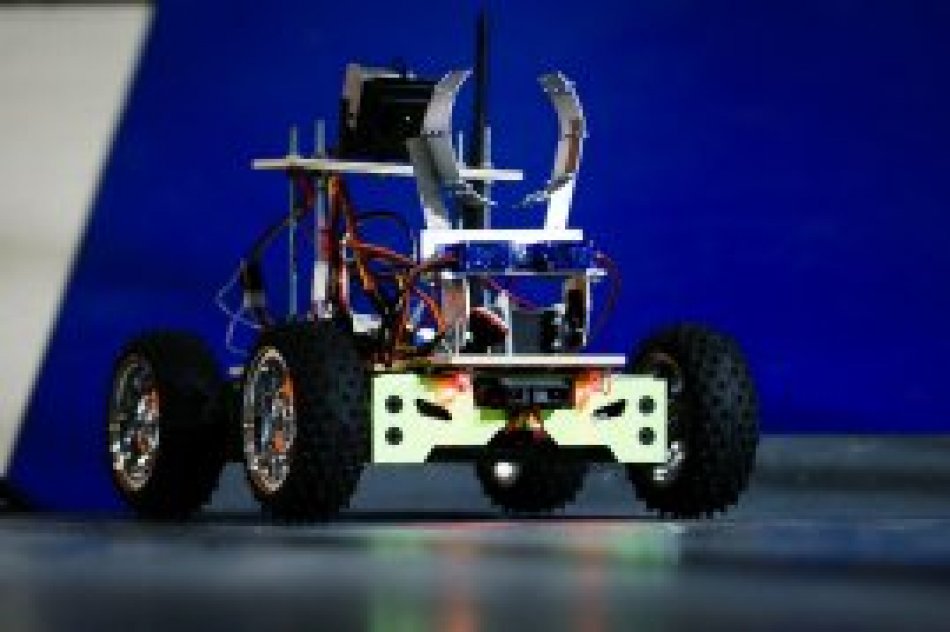
27 . RTC Cup: Extremal Pro

In «RTC Cup» Challenge the robot shall pass through the proving ground within the specified time. The proving ground is a reconfigurable obstacle course, a maze, made of cells. The maze made to resemble different indoor and outdoor terrains and obstacles, for search and rescue scenario. For each cell robot gain points, the number of points depend on difficulty of the task, located in the cell. In addition, when passing the proving ground the robot shall collect special «cans», and deliver them in special colour zones according to the «can» colour, to gain more points. Robot can demonstrate some autonomy in the area with the black line on the white field (for this task points are doubled, compared to nonautonomic tasks).
The task of the robot is to earn the most points.
"Extremal" categorie: remote robot control using only the picture from the camera and data of the robot sensors. Age restriction in the category "Extreme PRO": from 17 years. Route: the robot starts at one of the entrances to the labyrinth, and, moving by any path chosen by them, looks for an exit.
Robot can be built of any hardware components, nonhazardous for the wider public. The competition includes 2 attempts (rounds). The best of two attempts would be taken into account.
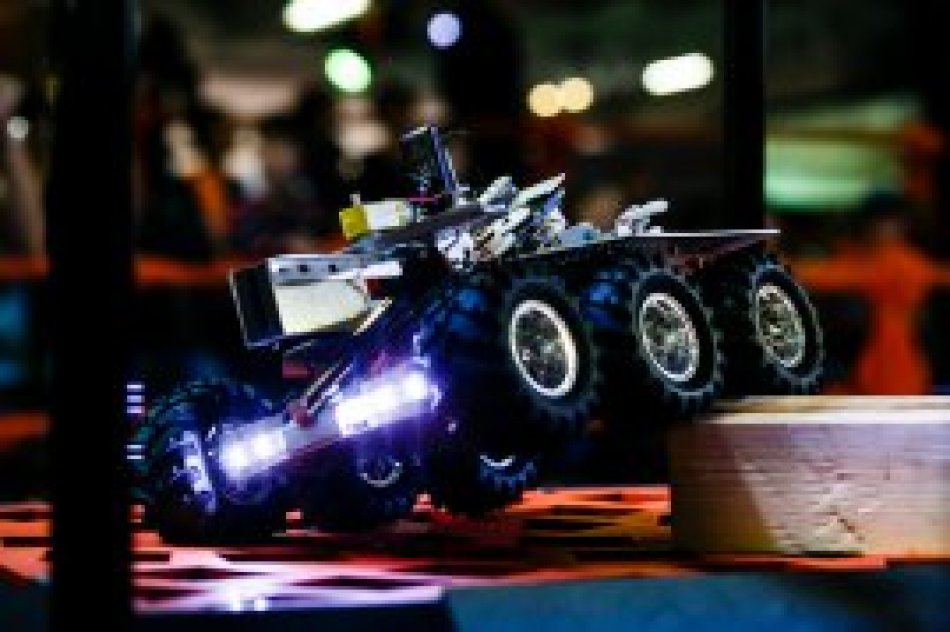
28 . RTC Cup: Extremal

In «RTC Cup» Challenge the robot shall pass through the proving ground within the specified time. The proving ground is a reconfigurable obstacle course, a maze, made of cells. The maze made to resemble different indoor and outdoor terrains and obstacles, for search and rescue scenario. For each cell robot gain points, the number of points depend on difficulty of the task, located in the cell. In addition, when passing the proving ground the robot shall collect special «cans», and deliver them in special colour zones according to the «can» colour, to gain more points. Robot can demonstrate some autonomy in the area with the black line on the white field (for this task points are doubled, compared to nonautonomic tasks). "Extremal" categorie: remote robot control using only the picture from the camera and data of the robot sensors. Robot can be built of any hardware components, nonhazardous for the wider public. The competition includes 2 attempts (rounds). The best of two attempts would be taken into account. For any further questions please contact schkvarka@gmail.com
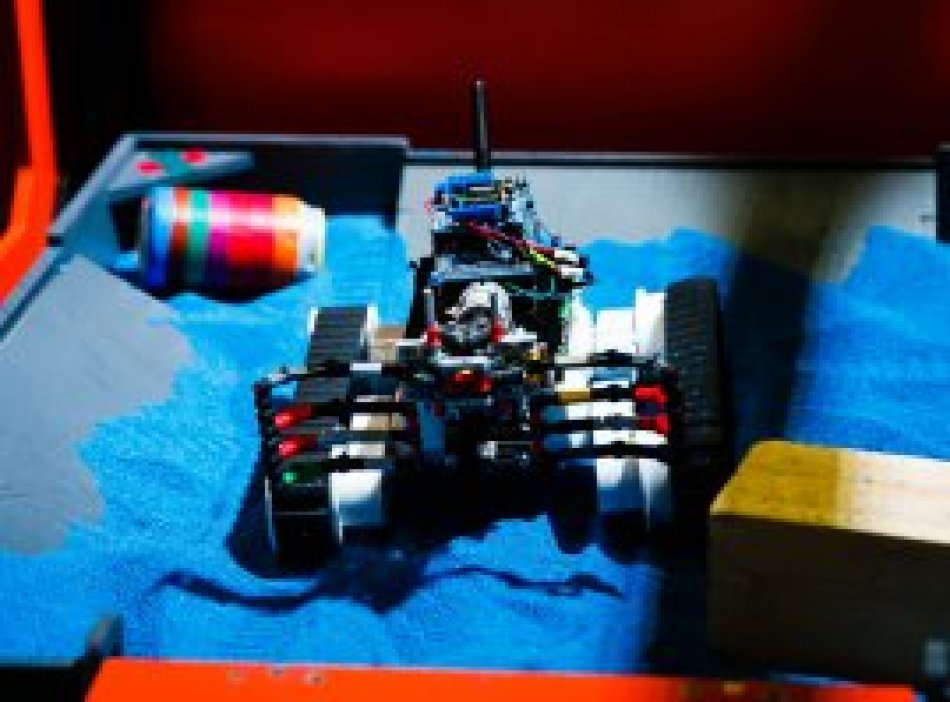
29 . RTC Cup: Seeker

In «RTC Cup» Challenge the robot shall pass through the proving ground within the specified time. The proving ground is a reconfigurable obstacle course, a maze, made of cells. The maze made to resemble different indoor and outdoor terrains and obstacles, for search and rescue scenario. For each cell robot gain points, the number of points depend on difficulty of the task, located in the cell. In addition, when passing the proving ground the robot shall collect special «cans», and deliver them in special colour zones according to the «can» colour, to gain more points. Robot can demonstrate some autonomy in the area with the black line on the white field (for this task points are doubled, compared to nonautonomic tasks). "Seeker" category: remote robot control that is visible for the operator. There is an age limitation: under 16 years. Robot can be built of any hardware components, nonhazardous for the wider public. The competition includes 2 attempts (rounds). The best of two attempts would be taken into account. For any further questions please contact schkvarka@gmail.com
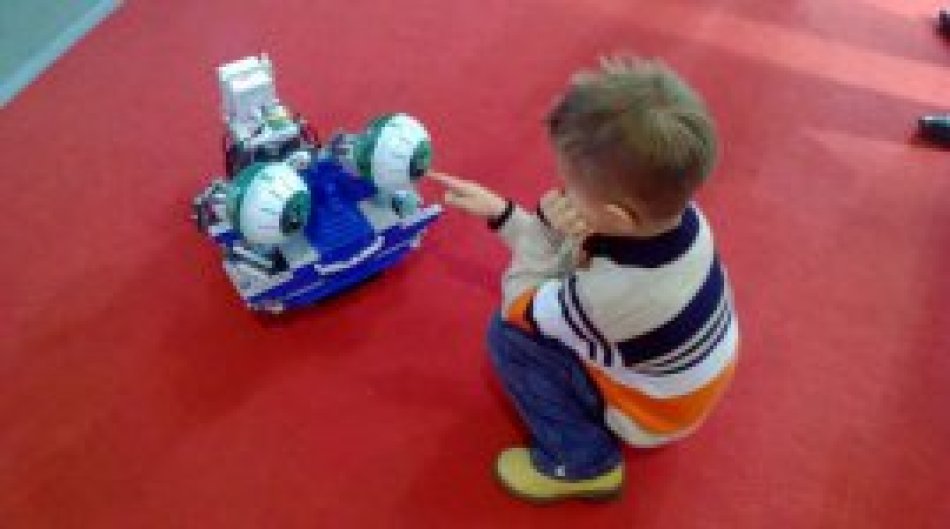
30 . Freestyle category: Elementary

In this category participants are free to create robots with no limits in tasks, objectives and rules. Creators are limited only in their own imagination. The winner is selected by the count of referees in the several criteria: Relevance, Novelty, Engineering complexity, Operability, Presentation, Aesthetics. Primary criteria is that it should be a ROBOT. The age limit in this category is 12 years.

31 . Freestyle category: Junior High

In this category participants are free to create robots with no limits in tasks, objectives and rules. Creators are limited only in their own imagination. The winner is selected by the count of referees in the several criteria: Relevance, Novelty, Engineering complexity, Operability, Presentation, Aesthetics. Primary criteria is that it should be a ROBOT. The age limit in this category is from 12 to 15 years.

32 . Freestyle category: High

In this category participants are free to create robots with no limits in tasks, objectives and rules. Creators are limited only in their own imagination. The winner is selected by the count of referees in the several criteria: Relevance, Novelty, Engineering complexity, Operability, Presentation, Aesthetics. Primary criteria is that it should be a ROBOT. The age limit in this category is from 16 years.

